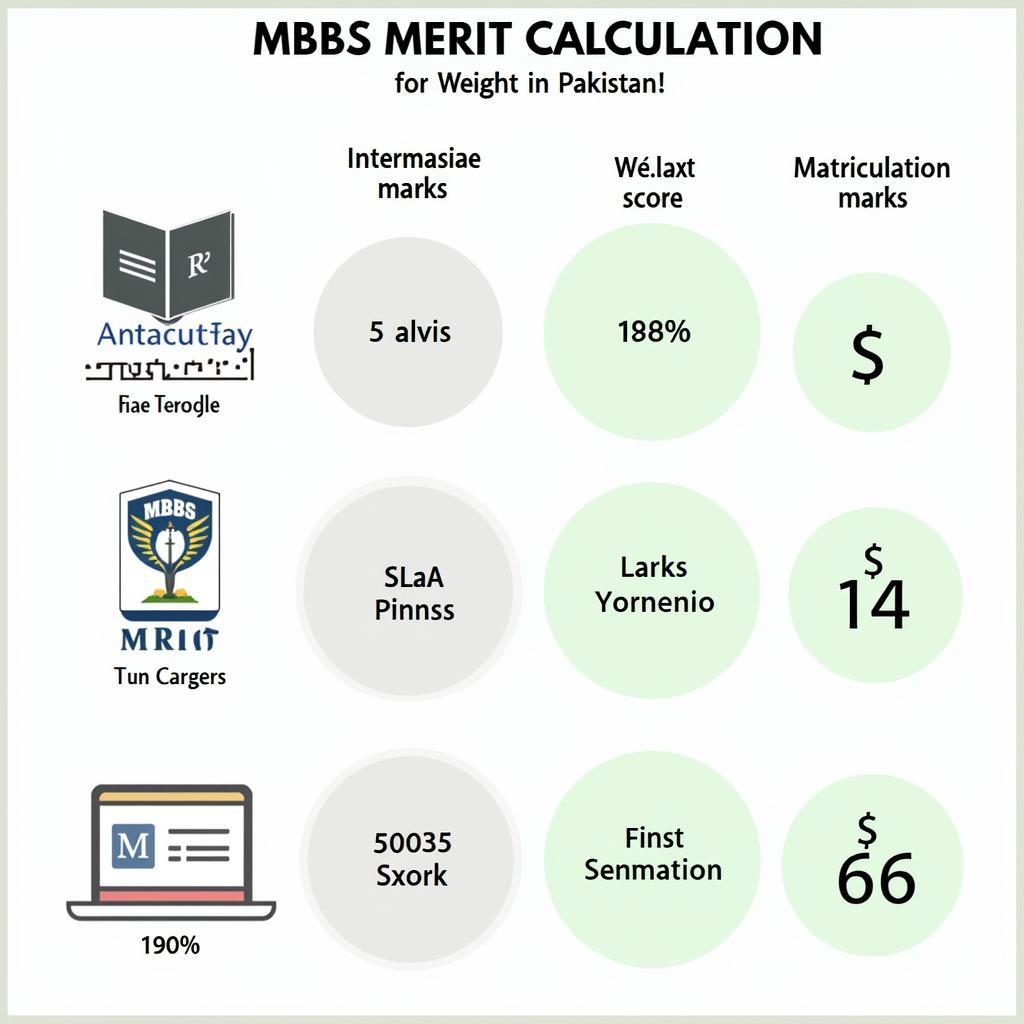Aspiring to become a doctor in Pakistan? Then the journey begins with securing a coveted seat in an MBBS program. But How Much Percentage Is Required For Mbbs In Pakistan? The answer, like most things in life, is not straightforward. There isn’t a single, fixed magic number that guarantees admission. Instead, it’s a dynamic interplay of several factors that determine your eligibility and success.
Unveiling the Selection Criteria: More Than Just Marks
While your academic performance, particularly in the intermediate exams (FSC pre-medical), plays a pivotal role, it’s not the sole determinant. Medical colleges in Pakistan employ a merit-based system, taking into account a combination of:
- Intermediate/Equivalent Examination Marks: This usually forms the bulk of your weightage, often around 50% to 70%.
- Medical College Admission Test (MDCAT): This standardized test assesses your aptitude in key subjects like Biology, Chemistry, Physics, and English. It usually contributes 30% to 50% of your overall merit.
- Matriculation/Equivalent Examination Marks: A small percentage, typically 10%, might be allocated to your matriculation grades.
 MBBS Merit Calculation in Pakistan
MBBS Merit Calculation in Pakistan
Navigating the Shifting Sands of Merit: Why Percentages Fluctuate
You’ve probably heard whispers of “high merit” and seen the cut-off percentages for MBBS admissions vary each year. This fluctuation is influenced by a confluence of factors:
- Number of Applicants: The higher the number of students vying for limited seats, the higher the competition and subsequently, the merit.
- Available Seats: Each medical college has a fixed number of seats allocated for MBBS admissions.
- Performance of Students: The overall performance of students appearing for the MDCAT and intermediate exams significantly influences the merit. A year with exceptionally high scores across the board will naturally see a surge in merit.
- Provincial Quotas: Pakistan’s education system factors in provincial quotas, meaning a certain percentage of seats are reserved for students from specific regions. This can impact the merit for open merit seats.
Decoding the MDCAT: Your Gateway to Medical School
The MDCAT stands as a formidable yet surmountable hurdle on your path to medical school. This computer-based, multiple-choice exam evaluates your understanding of essential science concepts and analytical skills.
- Structure and Content: The MDCAT typically comprises 200 multiple-choice questions divided into sections of Biology, Chemistry, Physics, and English.
- Weightage and Scoring: Each correct answer carries one mark, and there’s no negative marking for incorrect responses. Your MDCAT score plays a crucial role in determining your overall merit.
 Student Preparing for MDCAT Exam
Student Preparing for MDCAT Exam
Beyond Percentages: Holistic Excellence Matters
While achieving a high percentage and acing the MDCAT are essential, remember that medical schools seek well-rounded individuals.
- Extracurricular Activities: Engage in activities that showcase your leadership skills, teamwork, empathy, and commitment to social causes.
- Strong Communication Skills: Medicine is as much about connecting with people as it is about scientific knowledge. Hone your communication skills, both written and oral.
- Passion for Medicine: Your dedication to the field, your understanding of its challenges, and your commitment to serving humanity should shine through.
“Admission to medical school is a multi-faceted process,” says Dr. Ayesha Khan, a renowned physician and medical school admissions advisor. “While grades and test scores are undoubtedly important, we also look for students who demonstrate empathy, resilience, a genuine passion for medicine, and a commitment to serving their communities.”
FAQs: Addressing Your Burning Questions
1. What is the minimum percentage required in Intermediate for MBBS in Pakistan?
While there’s no officially defined minimum percentage, most medical colleges prefer students with a minimum of 60% to 70% in their intermediate exams (FSC pre-medical).
2. Is it compulsory to appear in the MDCAT for MBBS admission?
Yes, the MDCAT is mandatory for seeking admission to MBBS programs in most public and private medical colleges in Pakistan.
3. Can I apply to medical colleges in Pakistan with A-Levels or equivalent qualifications?
Yes, students with A-Levels or equivalent qualifications are eligible to apply. However, you might need to get your grades equivalency certified by the relevant authorities.
4. What are the career prospects after completing MBBS in Pakistan?
An MBBS degree opens doors to a diverse range of medical careers. You can choose to practice as a general physician, specialize in a particular medical field, pursue research, or even explore opportunities in medical education.
Conclusion: Your Medical Journey Starts Now
While the quest to determine “how much percentage is required for MBBS in Pakistan” might seem daunting, remember that your journey toward becoming a doctor is a marathon, not a sprint. Focus on building a strong academic foundation, excelling in the MDCAT, and nurturing your passion for medicine. With hard work, dedication, and a strategic approach, you can transform your dream of donning the white coat into a rewarding reality.
For personalized guidance and support on your medical school application journey, connect with our team at +923337849799 or news.pakit@gmail.com. We’re here to help you every step of the way. You can also visit us at Dera Ghazi Khan Rd, Rakhni, Barkhan, Balochistan, Pakistan. We have a 24/7 customer support team ready to assist you.